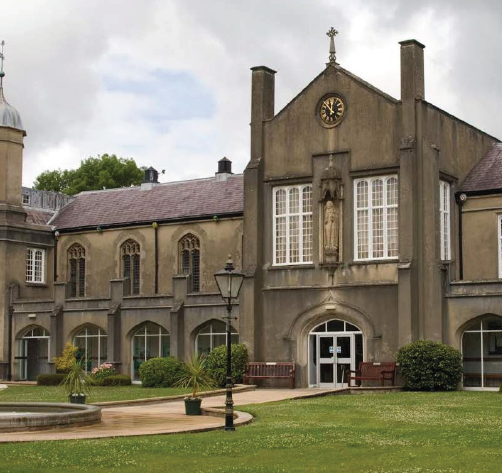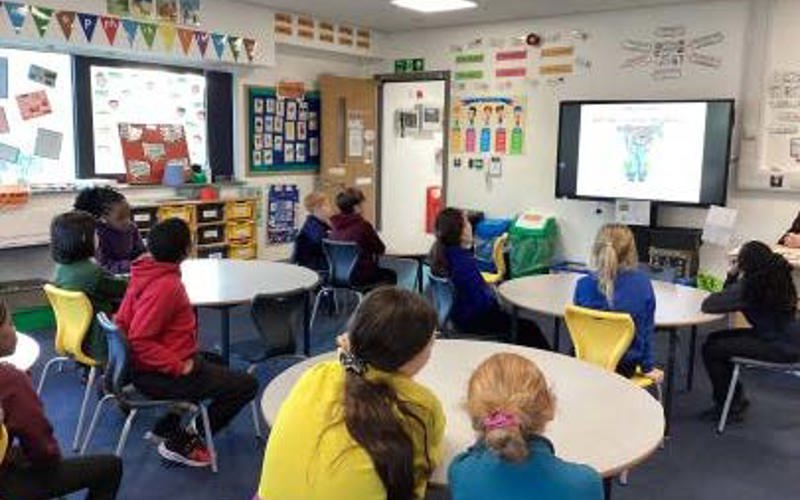Education
Plaid Cymru aiming higher for education


University: ‘Not the be all and end all’
“WHAT the Welsh Government needs to do,” said Simon Thomas, “is stop complaining about what those nasty Conservatives are doing and start setting out proposals of its own on Welsh education.”
The Plaid Education spokesperson and candidate for Carmarthen West and South Pembrokeshire was very clear on that point when he spoke with The Herald.
“Labour always seems to want to set up a Labour/Conservative fight. I would prefer to concentrate on formulating a Welsh policy, saying this is what we want to do; then, if the UK Treasury doesn’t play fair, we can point out what opportunities have been lost because of it. By just complaining, the current Welsh Government is simply not offering an alternative, positive vision.”
And being positive was very important to Simon Thomas.
“We have just launched our policy from Cradle to Career. That sets out a plan from 3-16 and in the post-16 framework gives a clearer balance between tuition fee policy and apprenticeships.”
Of that policy, Leanne Wood, Plaid’s leader has said: “We are investing in the very early years but also making sure people have a range of choices when they get to fourteen, fifteen and sixteen so that the academic route is not the only option but that there are serious vocational options as well.”
That point is clearly close to Simon Thomas’s own heart: “Last month we announced our plans to create 50,000 additional apprenticeships in Wales. Those would be new apprenticeships. Today, Labour has announced 100,000 apprenticeships in total. There are already 44,000 Welsh apprenticeships, so the level of apprenticeships being offered is in the same direction as our policy. We have made a commitment to show what we would do with the UK Government’s Apprenticeship Levy.
“It was a budget deal we made with Labour which stopped the fall in the numbers of Welsh apprenticeships. So I am, and Plaid is, committed to providing more apprenticeships and – importantly – more higher apprenticeships at Level 4 and beyond. By investing in higher skills there is a huge potential for Wales.”
And as for the narrower party point, Simon Thomas did not mince his words: “A clearer framework is vital. There are a lot of missing pieces in Labour’s plans and they have made no announcement on tuition fees at all.”
He continued: “The Welsh Government has kicked the question of tuition fees into the long grass. That is dishonest. After the election there will be a new Education Minister, Huw Lewis is retiring, and it will be up to them to make a decision the Welsh Government knows has to be made on tuition fees for higher education.”
The Welsh Government commissioned a report into higher education funding in Wales and we asked Simon Thomas about what it reported: “The report (by Professor Sir Ian Diamond) could not be clearer. All of those bodies which responded to it agreed that the current tuition fee policy is completely unsustainable.
“The evidence is overwhelming and unanswerable, but the Welsh Government has decided to wait until October and then probably feign surprise when it is told things have to change. As I say, the Welsh Government’s position on tuition fees is dishonest.
“It was Labour that introduced tuition fees. I fought it every step of the way in Parliament to stop it applying to Wales.
But what of Plaid’s policy?
“We’ve kept some flexibility in our plans, because we don’t know what will be the recommendation about the maintenance element of student support. But we have made it clear that continuing to send £100m of the Welsh block grant to English universities is a non-starter. You could argue that it would be tolerable in times of plenty, but these are times of austerity.
“We need to remember that of the tuition fee loan, the student sees not one penny. The students are funding the universities who are charging the maximum possible. 45% of students do not even reach the level of income where they need to repay the loans made to them.”
We asked where that left Plaid’s policy on tuition fee abatement, the ‘Learning Bonds’ it announced recently: “For a Welsh student studying in England, if they return to Wales within five years of graduation we will offset their tuition fee loan repayments for each full year. We want everyone to be able to study any subject and in any university they want to. But the current tuition fee policy means we give more money to universities outside of Wales than we do inside of Wales. This is unsustainable and Plaid Cymru believes that this is wrong. Our plans will enable students from Wales to study anywhere they want, and will ensure that the Welsh economy can benefit from the talent of Welsh students.
“Under Plaid Cymru’s plans, students from Wales who study a three-year degree will have £18,000 of their loans written off.”
Simon continued: “Our plan acknowledges wages in Wales are generally lower; it means that if you are, for example in London in a wellpaid job, a positive incentive exists for you to take your skills back to Wales.”
He smiled: “Significantly, I think, there’s been no attack on our policy from Labour: I think they are probably looking at something similar.”
Regarding postgraduate funding, Simon Thomas returned to his core grievance about the existing Welsh Government’s approach: “This is an example of where Labour is simply complaining instead of putting forward a positive alternative itself. The Welsh Government should be saying this is what we are going to do and challenging Osborne to allow Welsh students access to the loans system English students will have.
“It’s the usual thing: the Treasury has not considered the Welsh aspect: it is not devolution-aware when it comes to this sort of policy. But the lack of challenge from the Welsh Government, the lack of an alternative policy: that is letting Wales down.”
He continued: “We want to see similar scheme as in England, where from September people studying for postgraduate degrees will have access to loan funding for their studies. What this means is that English students will have tuition fee support for studying in Wales, whereas Welsh students are not eligible for any support to study anywhere.
“Our tuition fee policy will release money back to Hefcw to support part time study, Coleg Cymraeg and postgraduate study for Welsh students. The problem now is that, if we are in government after May it will already be too late to do something this year. There’s simply no headroom in the budget.”
On the deep cuts to the further education sector, Simon Thomas was cautious: “I don’t want to make a firm commitment before seeing the books, I have talked already about £100m being released back through changing the tuition fee policy. £70m of that was taken from HEFCW’s budget, the rest was robbed out of the Further Education budget. So, our higher education policy will release significant money back to FE and enable us to strike a fairer balance.
“A University education is not the be all and end all of education. We have to realise that. Young people need to have more and better choices: at the moment they are all being pointed in one direction – towards Higher Education. We are committed to looking from starting from the position that there is more than one option and that it is possible for young people to develop graduate level skills through further education and higher skills apprenticeships. The benefit for those young people is that they will not have student debt and will have the sort of higher skills that will be an advantage to them and an advantage for Wales.”
Simon reflected: “The problem is around tuition fees. If you want to pack the maximum number of people in for 9K a year, then the cheapest way is humanities but not at a high level. Not with the rigour associated with it. We’re in danger, and unis have said this, of a race to the bottom to feed the machine because everyone comes with 9K a year on their head.
“We have to change that. We have to provide a better infrastructure for young people, not simply churn them through a factory to produce graduates without the skills the economy needs.”
On Welsh Medium Education, Simon Thomas acknowledged: “There is a weakness in College education in Welsh. In sixth forms, there is some provision but that is centred about academic subjects, not things like Gofal Plant and other vocational skills.”
What about locally: “What Pembrokeshire County Council is clearly seeking to do is to scrap sixth forms through a partnership with Pembrokeshire College and then place the onus for post-16 Welsh Medium Education on Ysgol Preseli. I do not see how that can deliver vocational post-16 training in Welsh. There is an extent to which I share the view of Cymdeithas yr Iaith, that post-16 there is an issue about continuing Welsh Medium education post-16.”
He continued: “The important thing about the legislation about reorganisation is that decisions are made locally and not nationally. Local decision-making must come first. I can see people fighting for their schools’ sixth forms, but education has changed enormously. In rural areas, it is sometimes not going to be possible to retain sixth forms that can provide the range of courses needed.”
A wintry smile: “That said, when we’re out and about knocking on doors, Pembrokeshire County Council comes up and has a poor reputation on the doorstep.”
We concluded by asking Simon Thomas about a recent remark made by Carmarthenshire Councillor Meryl Gravell. Ms Gravell opined at a recent Executive Board meeting that the standard of teachers coming out of Wales’s training centres was substandard.
“Let’s put it this way, I don’t think she worded it correctly, or described the problem correctly. The issue is one of the training we give our teachers. It’s not the quality of the individuals, we are not delivering them with the skills they need. There has been a number of failed reorganisations. The problem has been that changes have aimed to provide a little bit for everyone.”
Simon Thomas was generous to Huw Lewis, the outgoing Education Minister: “I believe he is sincere in wanting to put things right with the way teacher training is delivered. We have to focus on preparing teachers for their careers and retaining them. Huw Lewis seems genuinely committed to raising the bar on teacher training.”
And Plaid’s policy: “As part of our Cradle to Career policy, we want teachers in Wales to get to the level of Masters in Education; providing CPD for two years and then a premium for teachers to reach higher standard.
“Teaching is the most important factor in raising schools standards and raising pupils’ attainment. That’s why Plaid Cymru wants to invest in our teachers, helping them remain on the cutting edge of best practice in order to drive up standards and raise attainment levels.
“We will offer teachers and teaching assistants a premium of up to 10% on their pay in return for developing additional skills. Plaid Cymru will reward upskilling and best practice, and will work with the sector to develop a system of accreditation, aiming for 25% of teachers to gain this premium.”
Simon Thomas concluded: “Education is the bedrock of a strong economy, and our plans are aimed at raising children’s attainment and delivering tangible economic benefits.”
Education
Family warns school move could harm child with ultra-rare condition

As closure looms, campaigners say Meidrim pupils thrive in ‘caring community’ as council consultation raises fears for vulnerable learners
A SMALL village primary school at the heart of rural Carmarthenshire is at the centre of a growing campaign to prevent its closure, with supporters warning that vulnerable children could suffer serious consequences if it shuts.

The Cymdeithas yr Iaith has backed efforts to secure the future of Ysgol Bentre Gymraeg Meidrim, describing small rural schools as “caring communities” that provide vital stability for children with additional needs.
At the centre of the case is pupil Tommy Webber, who lives with Bloom Syndrome — an ultra-rare genetic condition which causes complex medical issues and additional learning needs. He is believed to be the only child in Wales diagnosed with the condition.
Medical professionals have advised the school that continuity, routine and trusted relationships are essential for Tommy’s wellbeing. Any disruption — including changing schools, longer daily travel or unfamiliar staff — could have a negative impact on his health, emotional security and educational progress.
Supporters say the small, close-knit nature of Meidrim has allowed staff to provide consistent, personalised care that would be difficult to replicate elsewhere.

However, Carmarthenshire County Council opened a statutory consultation on Thursday (Jan 16) on proposals to close the school, prompting concern from parents, campaigners and language groups.
Speaking on behalf of the Carmarthen region, Cymdeithas yr Iaith representative Sioned Elin said Tommy’s experience reflects a wider truth about the role of small rural schools.
“Tommy’s story shows how a small school can be a safe haven for children with additional needs,” she said. “Education here is genuinely child-centred, and pupils are supported as part of a caring Welsh-speaking community.
“In the same school there is also a deaf pupil, and the other children have learned some sign language so they can communicate with her. That demonstrates how this kind of environment benefits every child, not just one.”
She added that decisions about closures should not be based solely on budgets or pupil numbers.
“The impact cannot be measured purely in financial terms. The question must be whether any alternative provision can truly meet the needs of children who rely on stability and familiarity every day.”
Campaigners argue that losing the school would not only affect education standards but would also weaken the Welsh language and the social fabric of the village.
A supporting letter from hospital clinicians has been submitted as part of the consultation process.
Residents are now urging the council to recognise the wider value of small rural schools before making a final decision.
Education
Language commissioner launches probe into school closure impact on Welsh

THE WELSH Language Commissioner has launched a formal investigation into claims that the proposed closure of a rural Carmarthenshire primary school did not properly assess the impact on the Welsh language.
Campaign group Cymdeithas yr Iaith confirmed this week that the Welsh Language Commissioner will examine whether Carmarthenshire County Council complied with its legal duties when producing a language impact assessment linked to plans to close Ysgol Llansteffan.
The council issued a statutory notice last year proposing to shut the village school at the end of the summer term as part of wider education reorganisation. A final decision had been expected this spring.
However, the investigation now creates fresh uncertainty over the timetable.

Complaint over ‘insufficient assessment’
Cymdeithas yr Iaith says it submitted a formal complaint arguing that the council failed to produce a sufficiently detailed assessment of how the closure could affect Welsh-medium education and the wider Welsh-speaking community.
The group claims the authority selectively used data to support closure rather than examining all available evidence objectively.
Two key concerns were raised.
Firstly, campaigners argue there may not be enough places in neighbouring Welsh-medium schools to accommodate pupils from Llansteffan and nearby housing developments, potentially forcing some families into English-medium provision.
Secondly, they say the assessment did not meaningfully consider the school’s role as a community hub or explore ways the site could generate income and support local Welsh-language activities.
On behalf of local members, Ffred Ffransis said: “There will not be places for all the Llansteffan children, nor for the children of the new housing estates, in other Welsh-medium schools in the area.
“The most cost-effective way of providing sufficient places locally in Welsh-medium education is by keeping open Ysgol Llansteffan and making better use of the buildings, including environmental education and community use.”
Formal investigation
In a letter to the group, the commissioner confirmed an investigation will be held under Section 71 of the Welsh Language Measure to determine whether the council complied with Welsh language standards.
The probe could take up to three months.
Campaigners believe this may delay implementation of the closure and could require the council to revisit its assessment and potentially carry out a fresh statutory consultation.
Ffransis said: “Even if the council now decided to make a full and meaningful assessment, there would likely have to be a new consultation. The original decision may have been taken on a faulty basis.”
He added that similar concerns had been raised about language impact assessments connected to other proposed school closures in the county.
Council position
The council has previously said that school reorganisation proposals are driven by falling pupil numbers, financial pressures and the need to ensure sustainable, high-quality education.
Authorities across Wales have faced difficult decisions in recent years as rural rolls decline and building maintenance costs rise.
It is expected the council will respond formally to the commissioner’s investigation in due course.
What happens next
If the commissioner finds that language standards were not properly followed, enforcement steps could be taken and the process delayed or revisited.
For families in Llansteffan, the outcome may determine whether their local Welsh-medium school remains open beyond the summer term.
The Herald has contacted Carmarthenshire County Council for comment.
Further updates will follow as the investigation progresses.
Community
Cilgerran Church in Wales school petition to be heard

A PETITION opposing proposed changes for a north Pembrokeshire school is to be heard by councillors later this week.
At last May’s meeting, Pembrokeshire County Council considered a report of the School Modernisation Working Group which outlined the findings of a review of education provision in the Preseli area.
A later July meeting backed a general consultation to discontinue Cilgerran Church in Wales Voluntary Controlled School, and to establish it as a 3-11 community school.
“In particular, the review considered the extent of surplus school places in the area, set against a significant decline in the pupil population,” the council in its consultation has said.
The consultation closed on January 30.
Hundreds have opposed the proposed changes, with a petition, on the council’s own website opposing the changes recently closing after gaining 391 signatures.
Any petition of more than 100 signatures triggers a debate at one of the council’s scrutiny committees, in the case of Cilgerran that debate taking place at Pembrokeshire County Council’s February 5 schools and learning overview and scrutiny committee.
The Cilgerran e-petition, created by Louise Williams, raised concerns including the school could become part of a federation, a loss of permanent head teacher on site, a shared head teacher would have to oversee several schools, loss of funding control and the ability to maintain the school’s current healthy and stable funding, and a loss of commitment to the church, in turn could impact on the school’s and pupils values, beliefs and cultural beliefs.
It said: “Ysgol Cilgerran VC school has strong links with the Church community in Cilgerran and we believe this will have a negative impact on the children who attend the school, the community of Cilgerran and the links between the two.
“We are proud of our school ethos and values which are strengthened by our links with the church. The school has close and strong relationships with our Church in Wales federation governors one of which is also our safeguarding governor.
“Our Church Federation governors work closely with the school and are regular visitors to the school and the children. They provide vital support and guidance to the school and have a positive impact on the Children’s education. We believe these links will be weakened by this proposal to remove our VC status and we believe this is an un-necessary action.”
The proposals for Cilgerran are part of a wide range of potential education changes in the county.
Two petitions, opposing the potential closures of Manorbier and Ysgol Clydau schools, were recently heard at full council and a further petition opposing the potential closure of Stepaside School has recently been launched, which has generated enough support to be heard at a future council meeting.
-

 Health7 days ago
Health7 days agoConsultation reveals lack of public trust in health board
-

 Crime18 hours ago
Crime18 hours agoSex offender jailed after living off grid in Pembrokeshire and refusing to register
-

 News2 days ago
News2 days agoPrincess of Wales visits historic Pembrokeshire woollen mill
-

 Crime6 days ago
Crime6 days agoPembroke man accused of child sex offences sent to Swansea Crown Court
-

 Health4 days ago
Health4 days agoDoctor struck off after sexual misconduct findings at Withybush Hospital
-

 Community6 days ago
Community6 days ago50s women threaten legal action over pension compensation refusal
-

 Business7 days ago
Business7 days agoEight-year prison sentence after vehicle stop uncovers drugs worth over £150,000
-

 Crime2 days ago
Crime2 days agoHakin man’s appeal delayed again as Crown Court seeks guidance on insurance law


























